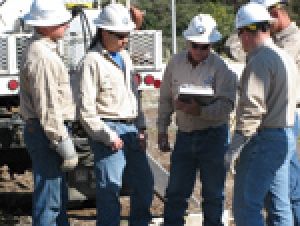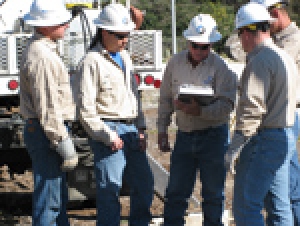
Evaluating Crew Supervisors

Do your crew supervisors know what they should know about effectively managing a group of lineworkers to construct and maintain high-voltage power line systems? Often we find out the answer to this question too late. We made too many assumptions early on and the crew supervisor has now failed – possibly in a big way. If we had only realized what this supervisor didn’t know before he took on all these responsibilities, maybe we could have prevented these problems.
Sound familiar? We hire people and promote our folks into supervisory positions with the best of intentions. When companies grow, they need talented new people on board. When a crew supervisor position opens up, we want our existing, hardworking employees to advance in the company if possible. Career advancement opportunities are part of the reason people stay with an organization. However, too often we make these decisions based on a gut feeling. There is a better way.
Evaluating Competencies
There are three good reasons to evaluate someone’s current level of competencies:
• To better understand what they know and are able to do – right now.
• To identify remedial training and education that will address found weaknesses.
• To design a continuing education and skills development program to help keep them at the top of their game.
An added benefit is that we now have a baseline for this employee and can measure his future growth against this beginning point.
Contrary to the opinion of many lineworkers in the field, we do not test and evaluate an employee because we are looking to cut his or her pay or because we are looking for an excuse to demote or fire someone. However, those fears do exist in the workforce and we need to be sensitive to them. Explaining to the rank and file how we will evaluate and select the right person for the job typically goes a long way toward reducing workers’ natural fears of being evaluated.
So when we decide to evaluate the employee we have selected to fill this new crew supervisor opening, what are we evaluating? There are three things that need to be assessed:
• Attitude
• Knowledge
• Skills
Attitude is very subjective and usually apparent fairly quickly with a new hire. With an existing employee you may want to promote, his or her attitude has likely become obvious over time. You know attitude when you see and experience it, and you know which attitudes work in your company and which ones don’t.
Now let’s focus on the other two competencies: knowledge and skills.
The New Crew Supervisor’s Knowledge Test
What is important for the new crew supervisor to know before his or her first day on the job? Suggested below are six areas of responsibility in which the new crew supervisor should be tested:
• Regulatory knowledge
• Tools and equipment knowledge
• Energized work safety knowledge
• Electric system knowledge
• General safe work practices knowledge
• Effective supervisory practices knowledge
Each of these areas has an impact on the success of a crew supervisor. It’s not unusual to find an experienced journeyman with strengths in a few of these areas, but weaknesses in others. We need our crew supervisors to be strong in all of them. By testing, we can identify the weak areas and provide remedial training as needed.
What if we find evidence of weaknesses across the board with our candidate in these important areas of knowledge? Maybe he or she isn’t really the perfect candidate right now. As hard as the discussion may be, in the long run we are doing this person a favor by stepping back and helping them prepare for the next opportunity that may come up. The company needs a competent supervisor over that leaderless crew from day one. Just putting anyone in that position doesn’t do the other crew members any favors either.
A responsible decision to not hire or promote someone – for the right reasons – also sends an important message to all those in the company who are paying attention. We want them to see that in order to be chosen, you must measure up to the standards the company has set for this position. And management is going to evaluate every candidate to ensure those standards are met. When these statements are both policy and practice, a clear message is sent to everyone in the company about what is important.
The New Crew Supervisor’s Skills Evaluation
The final component of evaluating candidates for a crew supervisor’s position focuses on skill proficiencies. This requirement may be important in your company, or it may not be. It all depends on the expectations you set for that crew supervisor: Will he or she be a working crew supervisor or not? In many organizations, the crew supervisor is expected to be able to do any job that needs to be done on a crew, from the duties of a groundman/helper to working next to the experienced journeyman performing energized maintenance work and everything in between.
In other companies, crew supervisors are expected to plan, coordinate, direct and oversee the work being done, but not to actually do it themselves. Some organizations feel strongly that a power line crew supervisor should be a journeyman lineworker and able to do it all. Others are satisfied with a crew supervisor knowing what each crew member’s job entails, including best work practices, but that supervisor is expected to manage the crew’s work, not do it with them.
Let’s say that your crew supervisors are expected to be working foremen. In most cases, you are looking for a qualified journeyman lineworker as a candidate for the new opening. Testing the competencies of a journeyman lineworker involves both knowledge and skills testing.
A few years ago, the Institute for Safety in Powerline Construction (www.ispconline.com) conducted a study in the electric utility industry based on what a lineworker should know and be able to do to be called a journeyman. Using that study, ISPC defined 191 competencies that are commonly expected of a qualified journeyman lineworker doing energized work. From that list, ISPC then went on to develop knowledge tests and skills evaluations that help gain important insights into what a lineworker knows and is able to do on the job and in the field. Tests such as these can help management determine the qualifications of each candidate that we have for our working foreman opening.
The Big Picture
The good news is that none of this has to be a guessing game based on someone’s gut feeling. With a rational process for selecting and evaluating a candidate for our new crew supervisor position, we can predict the chances for success with greater accuracy than ever before. Additionally, using reliable instruments for evaluations can provide an objective foundation for decision-making and help offset much of the personal bias that naturally occurs.
We want our candidate for the crew supervisor position to succeed. Effectively managing a group of lineworkers performing energized power line construction and maintenance at different work sites every day is an extraordinary challenge. To allow someone to assume those duties without being truly prepared is a terrible mistake that may even result in injuries or fatalities.
The big picture may not really be that big after all; it pretty much boils down to effective crew and job management and staying safe. However, looking behind the scenes at today’s successful crew supervisors, we find that many were forced to learn on the job what it truly means to be successful. In most cases no one got killed, but it’s possible that was just good luck. I hope that no one would intentionally rely on luck in this business. Good selection processes and effective evaluation tools are now available to improve the odds. All we have to do is start using them.
About the Author: Ronald J. Schenk, CUSP, is the executive director of the Institute for Safety in Powerline Construction, an electric utility industry association focusing on safety and training for lineworkers. His career in the utility industry spans 21 years and includes 14 years on staff with an Engineering News-Record Top 5 power line contractor where he served as director of training for 1,800 lineworkers. For more information, call 866-880-1380 or email Schenk at ron@ispconline.com.

